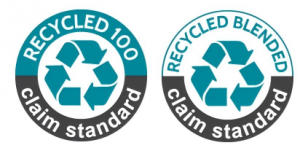Introduction
Statistics indicate that tens of millions of tons of plastic waste are improperly disposed of in the natural environment annually, resulting in soil degradation, aquatic ecosystem pollution, and health risks across the biological chain.
To address this, global efforts focus on sustainable recycling and the use of recycled materials, supported by regulations and standards.
Key industry certifications like the Global Recycled Standard (GRS) and Recycled Claim Standard (RCS) enhance market competitiveness by ensuring recycled content and supply chain transparency. GRS applies to products with at least 20% recycled content, while RCS covers those with a minimum of 5%. As eco-friendly demand rises, these certifications are crucial for businesses to showcase sustainability.
Industry Certification: GRS (Global Recycled Standard) and RCS (Recycled Claim Standard)
Plastic recycling certifications not only provide authoritative credibility for recycled materials but also serve as a critical tool for businesses to enhance market competitiveness.
Among these, the GRS (Global Recycled Standard) and RCS (Recycled Claim Standard) certifications are globally recognized standards for recycled materials, applicable to products with varying levels of recycled content.
GRS Certification
GRS certification applies to products with at least 20% recycled content and includes criteria for social responsibility, environmental management, and chemical management.
Additionally, GRS certification mandates that businesses establish a traceable supply chain system. From the recycling stage to the final B2B transaction, every link in the supply chain (including manufacturers, traders, and brand owners) must be certified to ensure the integrity and traceability of recycled materials.

RCS Certification
RCS certification applies to products with a minimum of 5% recycled content and focuses primarily on recycled material content and supply chain traceability.

Businesses meeting the relevant recycled content requirements can use certification labels on their products, showcasing their environmental attributes and significantly enhancing market competitiveness.
| Industry Certification | GRS (Global Recycled Standard) | RCS (Recycled Claimed Standard) |
Minimum Recycled Content Requirement | ≥ 20% | ≥ 5% |
Recycled Content Requirement for Label Use | ≥ 50% | If recycled content is between 5% and 95%, use the Recycled Blended label. If recycled content is ≥ 95%, use the Recycled 100 label. |
| Target | Increase the use of recycled materials in products and reduce/eliminate the harm caused by their production | Increase the use of recycled materials in products |
| Standard Owner |
Textile Exchange (TE) | |
| Nature | An international voluntary product certification for recycled material content. | |
Regulations and Standards for Plastic Recycling
With the growing emphasis on sustainable development, governments worldwide have introduced a series of regulations for plastic recycling, aiming to standardize plastic collection and recycling processes while encouraging the use of recycled materials.
European Union
The EU’s Packaging and Packaging Waste Regulation (PPWR) mandates that single-use plastic beverage bottles contain at least 30% recycled content by 2030, increasing to 65% by 2040. These targets aim to significantly boost the use of recycled plastic in packaging and promote the sustainable development of the plastic packaging industry.
Additionally, several EU member states have implemented tax incentives to encourage the use of recycled plastics.
For example, in Belgium, businesses can receive a €50 per ton tax reduction if recycled plastic content in commercial and industrial packaging exceeds 30%. In Spain, the portion of recycled plastic in packaging is exempt from the plastic tax.
United States
In 2022, New Jersey passed Senate Bill 2515 (SB 2515), requiring minimum recycled content standards for various packaging materials (including rigid plastic containers, plastic beverage containers, glass containers, paper and plastic carryout bags, and plastic trash bags) starting in 2024.
For plastic beverage containers, manufacturers in New Jersey must ensure a minimum of 15% recycled content by 2024, increasing by 5% every three years to reach 50% by 2045 (except for hot-fill beverage bottles, which have a post-consumer recycled content target of 30%).
In California, the AB 793 law, approved in 2020, requires plastic beverage containers to include at least 15% post-consumer recycled plastic starting January 1, 2022. This requirement increases to 25% by 2025 and 50% by 2030.
China
In 2021, China’s National Development and Reform Commission and Ministry of Ecology and Environment jointly issued the 14th Five-Year Plastic Pollution Control Plan, emphasizing the enhancement of plastic waste recycling and the acceleration of standardized collection, recycling, and disposal of plastic waste.
Furthermore, in the 2025 government work report, the Premier explicitly called for strengthening waste recycling, promoting the use of recycled materials, and advancing the circular economy. The report also highlighted the need to develop green consumption incentives to promote sustainable production and lifestyles.
Conclusion: The Growing Importance of Recycled Plastic Certification
As global environmental issues become increasingly prominent and consumer demand for eco-friendly products rises, plastic recycling has become a key direction for the transformation and upgrading of the plastic industry. Against this backdrop, the importance of recycled plastic standards and certification systems is becoming more evident.
GRS/RCS certifications offer a transparent, authoritative framework for recycled plastic products. By obtaining these certifications, businesses can clearly demonstrate their commitment to sustainable development, effectively enhancing their brand’s social value and market competitiveness.
At the same time, these certification systems assist businesses in optimizing supply chain management by ensuring recycled material content and traceability, thereby better meeting consumer expectations for green and eco-friendly products and gaining a competitive edge in the market.
As a professional sustainable certification consulting company, REACH24H provides comprehensive services for GRS/RCS certification, including pre-consultation, application submission, factory audit assistance, and final certification acquisition. We ensure precise control throughout the process, helping businesses efficiently and successfully achieve certification.
If you have any questions about GRS/RCS certification, please feel free to contact our experts at customer@reach24h.com.





